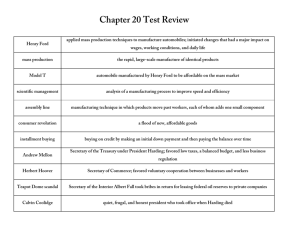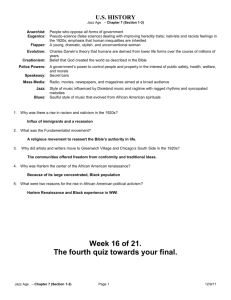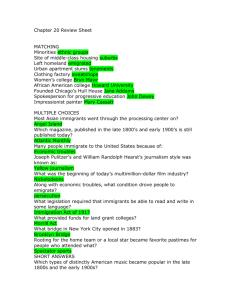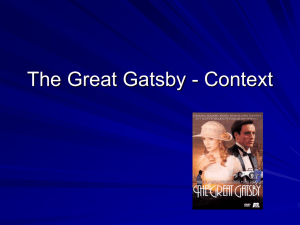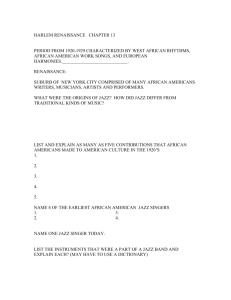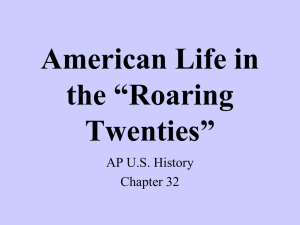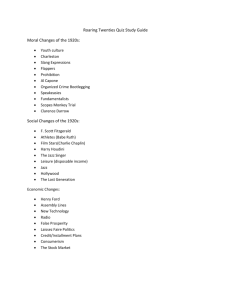Roaring ‘20s Chapter 31
advertisement
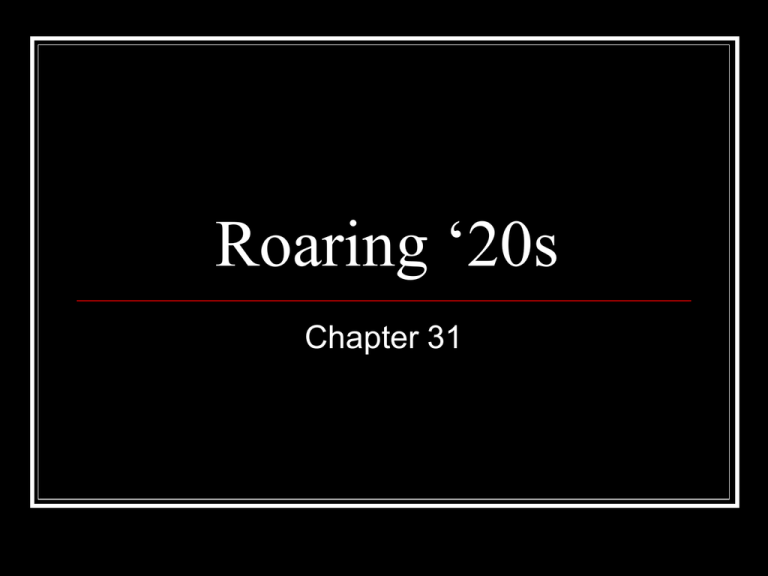
Roaring ‘20s Chapter 31 Jazz Age 1920's collectively known as the "Roaring 20's", or the "Jazz Age" in sum, a period of great change in American Society - modern America is born at this time for first time the census reflected an urban society - people had moved into cities to enjoy a higher standard of living A Society in Conflict for immigrants – the point of origin had shifted to S & E Europe and new religions appeared: Jewish, Orthodox, Catholic N. European immigrants of early 19c. feared this shift and felt it would undermine Protestant values this fear was known as NATIVISM many wanted Congress to restrict immigration, leading to a quota system that favoured n. areas of Europe National Origins Act fear of immigrants (from SE Europe) led to a sentiment known as the Red Scare (fear of comm. post-Bolshevik Rev.) A Society in Conflict Wilson’s Attorney General, A. Mitchell Palmer, wanted to take a shot at the presidency - he used fears of both immigrants and communism to his advantage he had J. Edgar Hoover round up suspected radicals, many of which were deported (Palmer Raids) Sacco-Vanzetti Trial Italian immigrants and radicals Unfair trial – convicted and executed KKK Anti-Black Anti-Catholic Anti-Immigrant Anti-Semitic Anti-bootleggers Anti-women’s suffrage Great rise and then fall in the 1920s Prohibition • “Noble Experiment” bans manufacture and sale of alcohol adopted in 1919 - 18th AMENDMENT an outgrowth of the temperance movt in WWI, temperance became a patriotic mvmt. - drunkenness caused low productivity & inefficiency, and alcohol needed to treat the wounded Prohibition difficult law to enforce... organized crime, speakeasies, bootleggers were on the rise Al Capone virtually controlled Chicago “Eliminated” competition Bribed police officers Prohibition finally ended in 1933 w/ the 21st Amendment Scopes Trial Dewey – learn by doing Science vs. Religion Scopes – high school biology teacher who was indicted for teaching evolution Defended by Clarance Darrow Wm. Jennings Bryan prosecuted for fundamentalists Outcome – Scopes loses, but it was a hollow victory for fundamentalists Heroes of the ’20s Babe Ruth – homerun king Jack Dempsey – boxing king First million dollar gate Charles Lindbergh – pilot who crossed the Atlantic Wholesome, handsome youth Consumerism Radio Advertising! Knitted the nation together By persuasion, seduction, sexual suggestion Make Americans want more, more, more Installment Plan/Credit Hollywood Films First Talkie – the Jazz Singer -- 1927 Consumerism Assembly line methods and mass production techniques Frederick Taylor – father of scientific mgmt. Eliminate wasted motion Automobile and related industries Ford mastered the standardized assembly line By 1929, 29 million cars were registered in US Glass, rubber, fabric, service stations, etc. women... 1920 - 19th Amendment gave them the federal vote after 1920, social circumstances changed too as more women worked outside the home and more women went to college and clamoured to join the professions 1st birth control clinic – Margaret Sanger women didn't want to sacrifice wartime gains amounted to a social revolt women... characterized by the FLAPPER/ "new woman" (bobbed hair, short dresses, smoked in public...) Independent Justified new sexuality with writings of Freud – sexual repression leads to ills Danced to Jazz Music Great Migration Great Migration 1910-1920 Hundreds of thousands of African-Americans moved from the South to the cities of the North In search of jobs However, northern cities, in general, did not welcome the massive influx of African-Americans Tensions escalated Approx. 25 race riots in the summer of 1919 Harlem Renaissance African American Writers Claude McKay Literary movement led by well-educated, middle class African Americans A new pride in the African American experience Celebrated heritage Novelist, poet, and Jamaican immigrant Urged African Americans to resist prejudice and discrimination Langston Hughes Harlem Renaissance’s best known poet Poems described the difficult lives of working class African Americans Poems moved to the tempo of jazz and blues African Americans and Jazz Jazz was born in New Orleans Blend of instrumental ragtime and vocal blues Joe Oliver and his Creole Jazz Band traveled North to Chicago Louis Armstrong Carried Jazz with them Joined Oliver’s group His talent rocketed him into stardom Jazz spread quickly to other cities Popular music for dancing Marcus Garvey Marcus Garvey (Jamaican born immigrant) established the Universal Negro Improvement Association believed in Black pride advocated racial segregation b/c of Black superiority Garvey believed Blacks should return to Africa he purchased a ship to start (the Black Star line) attracted many investments: gov't charged him with w/fraud he was found guilty and eventually deported to Jamaica, but his organization continued to exist UNIA Parade, 1924 1920s Literature F. Scott Fitzgerald Ernest Hemingway The Sun Also Rises, A Farewell to Arms Anti-war experience Sinclair Lewis Great Gatsby, This Side of Paradise Commentary on false American ideals Babbitt – anti-conformity and materialism Lost Generation – rebelling against American society of the 1920s
